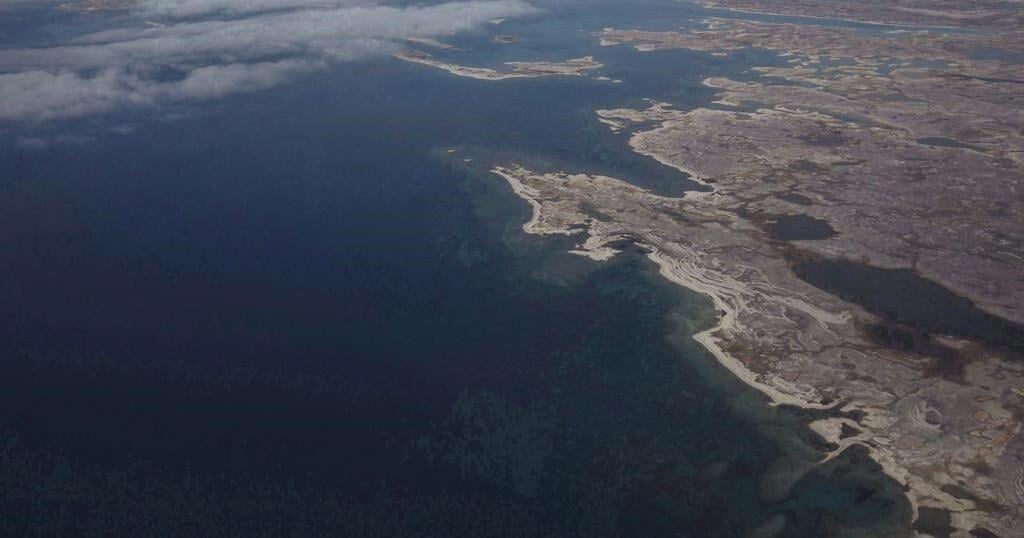Human remains resting in a remote Arctic cairn, visible emblems of one of the North’s most enduring mysteries, finally have a name.
Scientists have managed to identify bones belonging to a member of the Franklin expedition, a 19th-century voyage of exploration and discovery that ended in disaster, starvation and death. James Fitzjames — only the second member of the expedition’s crew to be identified by DNA — captained one of the expedition’s two ships and served as second-in-command after Sir John Franklin’s death.
“It helps us ask new questions about what really transpired,” said Doug Stenton, an archeologist at the University of Waterloo whose paper on the identification was released Tuesday.
Franklin’s ships, HMS Erebus and Terror, set out from England in 1845 in search of the Northwest Passage. The commander and his 128 men never returned.
More than 30 expeditions tried to find them.
Three graves were found on Beechey Island, their occupants identified. In 2014, the wreck of the Erebus was discovered through a blend of Inuit oral history and systematic, high-tech surveys just off the northwest coast of King William Island in Nunavut. The Terror was found two years later.
Fitzjames’ final resting place on King William Island was probably first found in the 1860s by Inuit and studied by archeologists in the early 1990s. With 451 bones from at least 13 Franklin sailors, it was not like the careful interments of Beechey Island.
“The human skeletal remains at this site, the bones, were scattered over several hundred square metres,” Stenton said.
Fitzjames’ DNA was isolated and profiled from a single molar. It had been extracted from a jawbone that bore the distinctive marks of man-made cuts, making Fitzjames the first identified victim of the cannibalism for which the expedition has become notorious.
“Surely the most compassionate response to the information presented here is to use it to recognize the level of desperation that the Franklin sailors must have felt to do something they would have considered abhorrent, and acknowledge the sadness of the fact that in this case, doing so only prolonged their suffering,” Stenton writes.
Stenton and his colleagues have advertised for years at venues, such as museum displays on the Franklin expedition, for DNA samples from people who believe they are descendants of those doomed sailors. Those ads paid off in 2021, when the great-great-great-grandson of Warrant Officer John Gregory was located in South Africa.
Fitzjames’ descendants, the family of a paternal second cousin of Fitzjames five times removed, have been contacted but have not yet spoken out.
“They were excited and really intrigued,” Stenton said.
Much is known about Fitzjames’ life. He joined the Royal Navy at the age of 12 and sailed in Central and North America, Malta, Syria, Egypt and China before the Arctic. He was known for his bravery and was awarded a silver cup by the City of Liverpool after he dove fully clothed into a river to rescue a drowning man.
It was Fitzjames who, as captain of the Erebus, wrote the main text of the last known message from the expedition, discovered at Victory Point on King William Island.
The note, co-signed by Fitzjames, reads in part:
“Sir John Franklin died on the 11th of June 1847 and the total loss by deaths in the Expedition has been to this date nine officers and 15 men … (We) start on tomorrow 26th for Backs Fish River.”
At the time of his death, Fitzjames had a wife and two children.
Meanwhile, Stenton and his colleagues continue to look for DNA matches to identify more remains. Fitzjames has been returned to his final home, where bones share a cairn with those of his shipmates on the windy, cobbled coast where he died.
Stenton said the identification of his remains, not far from those of Gregory’s, could reveal more about what happened to the expedition. Both Fitzjames and Gregory, he notes, sailed on the Erebus.
“It’s going to invite a lot of speculation,” Stenton said. “What events really transpired — especially after the retreat, when the ships were deserted?”
Franklin researchers have long wondered about leadership during the expedition as more officers died, Stenton said.
“What exactly was going on?” Stenton asked.
That question has been asked over and over as the Franklin expedition entered Arctic folklore, persisting through songs, novels, TV shows and undying curiosity. It remains with us.
This report by The Canadian Press was first published Sept. 24, 2024.

























